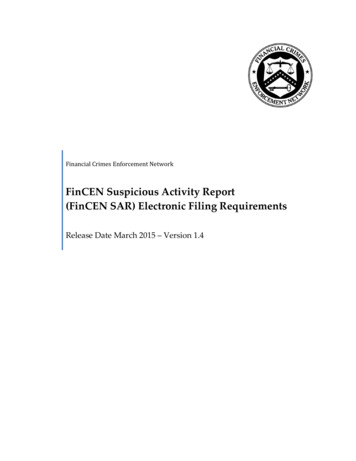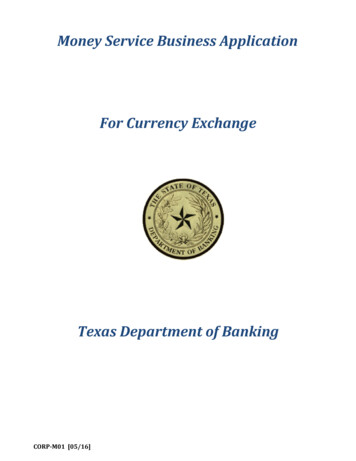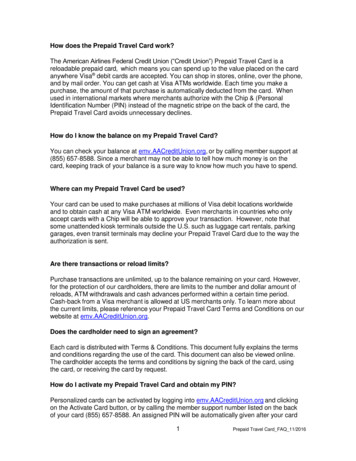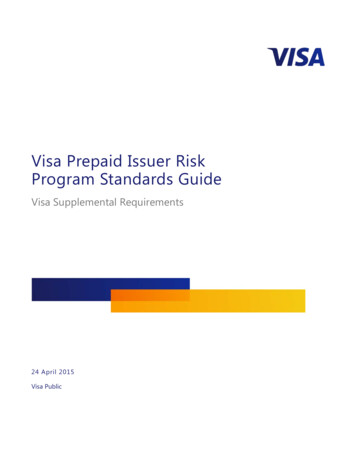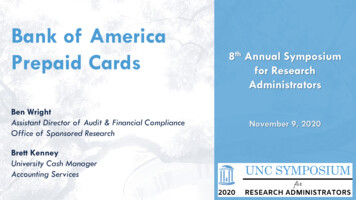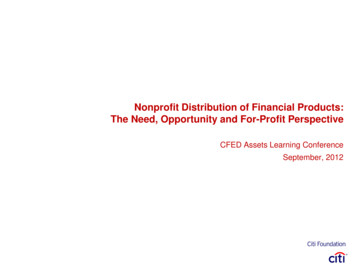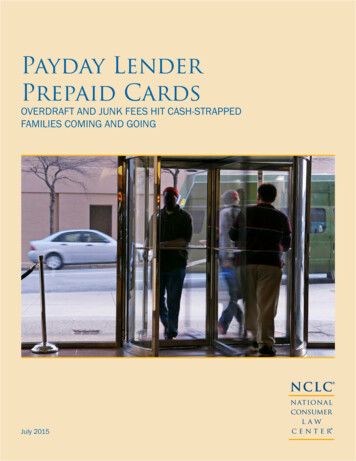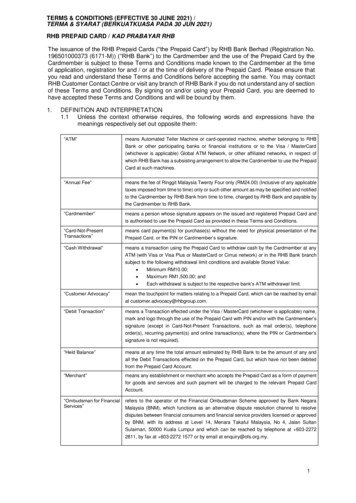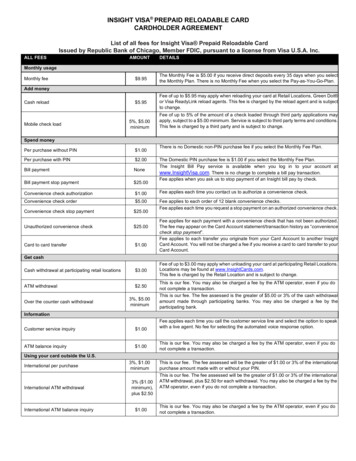
Transcription
July 2010FinCEN’s Proposed Prepaid Access RuleBY CHRIS DANIEL, NICOLE IBBOTSON & DIANE PETTITOn Monday, June 21, 2010, the Financial Crimes Enforcement Network (“FinCEN”) published theNotice of Proposed Rulemaking titled Amendment to the Bank Secrecy Act Regulations – Definitionsand Other Regulations Relating to Prepaid Access (the “Proposed Prepaid Rule” or “Proposed Rule”).The Proposed Prepaid Rule is mandated by Congress under the Credit Card AccountabilityResponsibility and Disclosure Act of 2009 (the “CARD Act”). The CARD Act directed FinCEN to issuefinal regulations regarding the sale, issuance, redemption or international transport of stored value,including stored value cards.1 The Proposed Rule does not apply to depository institutions (i.e. banks)issuing prepaid cards; it applies only to non-bank (1) providers of prepaid access, and (2) sellers ofprepaid access.In sum, the Proposed Prepaid Rule establishes a more comprehensive regulatory framework for“prepaid access” (which replaces the term “stored value”) in that it expands the number of partiessubject to the BSA and expands the obligations of those parties involved in the distribution of prepaidaccess. In our view, the additional obligations of the Proposed Prepaid Rule which will present thegreatest challenges for the prepaid industry are as follows:1.The AML Programs of both providers and sellers of prepaid access will need to include a customeridentification program (“CIP”) such that providers and sellers of prepaid access will have to collectname, date of birth, address and identification number from each person who obtains prepaidaccess under a prepaid program which is subject to the Proposed Rule. The customer informationwill need to be verified by the provider and seller of prepaid access and each such entity will havean obligation to keep certain customer records for five years.2.Certain entities involved in the distribution of open-loop prepaid cards which have thus far beenable to avoid registration as a money services business (“MSB”) will now be deemed a provider ofprepaid access and need to register with FinCEN as an MSB with the commensurate obligations ofthe same.3.All providers of prepaid access must file with FinCEN a description of each prepaid program forwhich it is the provider of prepaid access.4.Both providers of prepaid access and sellers of prepaid access will be required to make SuspiciousActivity Report (“SAR”) filings.All interested parties have until the close of business on July 28, 2010 to submit comments on theProposed Prepaid Rule to FinCEN. In addition to any comments one may submit with respect to the11
Proposed Prepaid Rule generally, FinCEN is specifically soliciting comments to certain questions whichwe have attached as Exhibit A. Please find below a summary of the Proposed Prepaid Rule.2Summary of the Proposed Prepaid RuleUnder the Proposed Prepaid Rule, FinCEN proposes to revise the Bank Secrecy Act (“BSA”) regulationsapplicable to Money Service Businesses (“MSBs”) with regard to stored value or, as newly defined,prepaid access. The term “prepaid access” is defined as “an electronic device or vehicle, such as acard, plate, code, number, electronic serial number, mobile identification number, personalidentification number, or other instrument that provides a portal to funds or the value of funds thathave been paid in advance and can be retrievable and transferable at some point in the future.” 3A. ExclusionsNotwithstanding the broad definition of “prepaid access” above, FinCEN, in the Proposed Rule,excludes five (5) categories of “prepaid access” programs that do not bear characteristics conducive tomoney laundering or illicit behavior. Any Provider (defined below) of BSA prepaid access programs willbe subject to regulation as a “provider of prepaid access” only to the extent the prepaid accessprograms do not fall within one of the enumerated exclusions.1.Payroll Programs. Programs where the employer (or a designated third party) adds funds to theprepaid card or access device for the payment to direct employees of benefits, incentives, wagesor salaries are exempt. This exclusion applies only when (i) the employer (or its agent) and notthe employee, can add funds to the card or device, and (ii) when the employer has a directrelationship with the employee (e.g. not where employer works through a third party to payfreelance employees). If the employee is allowed to add non-payroll funds to the payroll card thenthat payroll card would not fit within this exclusion.2.Government Benefit Programs. Programs where state or federal governmental agencies addfunds to the prepaid card or access device for the payment to individuals of government benefits,including unemployment, child support, disability, Social Security, veterans’ benefits, disasterrelief assistance and public transit benefits are exempt.3.Pre-Tax Flexible Spending Account Programs. Programs that are pre-funded by employeeand/or employer contributions to a pre-tax flexible spending account maintained by a centralpayor and reimbursed to the employee for health care and dependent care expenses are exempt.4.Prepaid Programs Limited to 1,000 Maximum Funds. Programs that provide prepaid accessto funds subject to limits that include a maximum value are exempt provided that (i) suchmaximum value is clearly visible on the prepaid access product, (ii) at the point of initial load, theload limit cannot exceed 1,000, (iii) at any point in the lifecycle of the prepaid access, no morethan 1,000 in total maximum value may be accessed, and (iv) on any given day, no more than 1,000 can be withdrawn with the use of the prepaid access.5.Closed Loop Prepaid Programs. Any programs offering “closed loop prepaid access” are exemptexcept to the extent they meet one of the two (2) exclusions from this exemption describedbelow.4 The term “closed loop prepaid access” is defined as prepaid access to funds or the value offunds that is limited to a defined merchant or location (or set of locations) such as a specificretailer or retail chain, college campus or subway system.522
These five (5) exclusions are only available, however, to the extent the prepaid program does notpermit: (i) funds or value to be transmitted internationally; (ii) transfers between or among users ofprepaid access within a prepaid program (e.g. person-to-person transfers); or (iii) the ability to loadmonetary value from other non-depository sources onto prepaid access (this latter requirement isinapplicable to closed loop prepaid access).6 While (i) and (ii) above appear to be somewhat selfexplanatory, subparagraph (iii) above is less clear. We did confirm with FinCEN that subparagraph(iii) is meant to apply to prepaid access cards that may be reloaded via a reload network.7 What is lessclear is whether subparagraph (iii) is broad enough to apply to every open-loop prepaid card that isinitially sold through an entity other than a bank (e.g. a retailer).B. “Provider of Prepaid Access” DefinitionIn general, the term “provider of prepaid access” (as used herein, “Provider”) will apply to any personthat principally “serves in the capacity of oversight and control for a prepaid program” which isdetermined on a “facts and circumstances” basis.8 The various facts and circumstances which FinCENdescribes include the following: The party who initiates, organizes and establishes the prepaid program (identifyingconsumer needs, developing business plan, obtaining financing, contracting with otherparties, etc.); The party who sets the terms and conditions of prepaid program, including the technicalspecifications involved in establishing and operating the prepaid program (e.g. saleslocations, fees, customer service assistance, etc.); The party who determines which other parties will participate in the transaction chain (e.g.issuing bank, payment processor, distributor, etc.); The party who has the ability to affect the movement of funds and who controls or directsthe initiation, freeze or termination of prepaid access; and The party who demonstrates control and oversight of transactions, which includes but is notlimited to the following:–Party whose name in which the prepaid program is marketed to the purchasing public;–Party that a “reasonable person” would identify as the principal entity (i.e. subjectivestandard);–Party to whom the issuing bank looks as its “principal representative” in protecting thenetwork relationship and brand integrity;–Party who determines distribution methods and sales strategies; and–Party whose expertise in the prepaid industry is recognized by other parties in theprepaid program as instrumental in delivering a successful prepaid program.Providers must comply with certain BSA requirements including (i) the maintenance of an effectiveAML program, (ii) SAR filings on transactions of at least 2,000 if the Provider knows, suspects, or hasreason to suspect that the transaction involves illegally-derived funds or is intended to conceal33
illegally-derived funds as part of a plan to evade federal law, (iii) the establishment of procedures toverify the identity of a customer of a prepaid program and the retention of such customer identifyinginformation, including name, date of birth, address and identification number, for five years, and(iv) the maintenance of transactional records generated in the ordinary course of business by thepayment processor or other party that facilitates transaction processing for five years.In addition, Providers are required to register with FinCEN, identify each prepaid program for whichthey provide prepaid access, and maintain a list of its agents. Currently, the BSA exempts issuers,sellers and redeemers of stored value from registering with FinCEN and filing SARs; this exemptionwould be deleted under the Proposed Rule.Those entities that are excluded from the definition of “Money Service Business” under FinCEN’scurrent regulations are excluded from the definition of “Provider.” Accordingly, banks and thoseentities registered with and regulated or examined by the SEC or the CFTC are not consideredProviders of prepaid access under the Proposed Rule.C. “Seller of Prepaid Access” DefinitionTypically, the term “seller of prepaid access” (as used herein, “Seller”) is a general purpose retailer,engaged in a full spectrum product line through a business entity such as a pharmacy, conveniencestore, supermarket, discount store or other retail stores. FinCEN views Sellers of prepaid access asbeing only second in importance to Providers of prepaid access because the Seller of prepaid access isthe party with the most face-to-face contact with the purchaser and, thus, is able to captureinformation at the point of sale which cannot be done by any other party in the transaction chain.9Sellers must comply with certain BSA requirements including (i) the maintenance of an effective AMLprogram, (ii) SAR reporting on transactions of at least 2,000 if the Seller knows, suspects, or hasreason to suspect that the transaction involves illegally-derived funds or is intended to concealillegally-derived funds as part of a plan to evade federal law, and (iii) the establishment of proceduresto verify the identity of a customer of a prepaid program and the retention of such customeridentifying information, including name, date of birth, address and identification, number for fiveyears. Unlike Providers, Sellers are not required to maintain transactional records or register withFinCEN.10We anticipate that the obligations placed upon the Seller (notably, the customeridentification/verification obligation) and the scope of the exclusions (and the exclusions from theexclusions) will likely generate a significant number of comments from the industry.The full text of the Proposed Prepaid Rule is available 94.pdf.44
Exhibit AQuestions for Public Comment1.Proposed terminology for this rulemakingWe seek public comment regarding the terms “prepaid access” and “provider of prepaid access,” andwhether they offer the best, most meaningful description of the product(s).2.International transport to be addressed in a subsequent rulemakingFinCEN intends to undertake a subsequent rulemaking proposal on the international transport ofprepaid access. In the interim, we invite comment on any aspect of the international transport issuethat we should consider in the context of a future reporting requirement directed at this type ofpayment mechanism.3.Alternate approach to designation of a single, central “provider”The many parties in the transaction chain each bring specialized knowledge to the program. Byimposing a separate, stand-alone obligation on each party along the transaction chain, we mayfacilitate the collection of more detailed information not filtered through any secondary perspective. AsFinCEN considers such an alternate approach, we seek comment on which prepaid programparticipants offer the most meaningful information, such as transaction information, purchaserinformation, or card holder information.4. 1,000 threshold aggregationIn its 2009 MSB NPRM, FinCEN sought comment on whether transactions involving multiple MSBservices should require aggregation for purposes of determining whether definitional thresholds hadbeen met. We received industry comments on this issue generally opposed to such a development.FinCEN is still considering the matter and welcomes any further comments on this issue, particularlywith respect to the inclusion of the sale of prepaid access in connection with other money servicesbusiness products.5.Closed loop prepaid access, generallyWe question whether it might now be appropriate to revisit the rationale that we have previouslyapplied to closed loop prepaid access even if such prepaid access is limited solely to domestic use. Arethere inherent vulnerabilities in closed loop prepaid access that require our consideration? Is closedloop prepaid access that allows use at more than a single retail facility (for example, at a shoppingmall) more vulnerable to abuse than a traditional closed loop product? FinCEN solicits comment onwhether and how it should reconsider its existing interpretation with respect to closed loop gift cards.6.Consideration of examination authorityWith respect to providers of prepaid access, FinCEN seeks comment on any particular aspects of theprepaid access sector that should be considered when making a decision about whether and how todelegate examination authority.55
7.Future rulemakings contemplatedAs noted earlier, we intend to engage in a rulemaking on instituting reporting requirements on theinternational transport of prepaid access. If there are other areas in need of consideration for futurerulemaking, we ask for the public to offer comment.8.SEC and CFTC-regulated entities; involvement in prepaid access sectorFinCEN is not aware of entities registered with, and regulated or examined by the SEC or CFTC thatare actively engaged in the prepaid access industry in such a way as to approach the equivalent of aprovider or seller of prepaid access, and solicits comment on the extent to which such entities areengaged in the prepaid access industry.9.Description of participants in the prepaid access transaction chainTo the degree that our sketch of the landscape is inaccurate or incomplete, we seek guidance andclarification from the commenting public.10.Employer use of prepaid access program for payroll purposesWe understand that some members of the law enforcement community would prefer to subject allprepaid payroll programs to the full range of BSA obligations. They assert that criminals oftenestablish shell companies and use these fictitious entities and non-existent employees as conduits tolaunder illicit funds. They believe that the potential for abuse of prepaid payroll cards is considerableand have voiced their concerns to us. We therefore seek public comment regarding the need toinstitute additional safeguards and/or conditions prior to excluding prepaid access to payroll fundsfrom the full extent of BSA responsibilities. Are there methods to ensure that the company andemployees are legitimate, and that the program is valid?11.Requirements placed on limited value prepaid access to enable exclusion from regulationWe request public comment on the following considerations regarding this section of the proposedrule: Please provide us with comments regarding alternative dollar limits, higher or lower thanthis proposal, daily or otherwise, and tied to a clearly delineated dollar amount or not.What merits are derived and what vulnerabilities are created by increasing or decreasingthe threshold? Would an additional activity limit threshold, such as annual multi-thousandthresholds that exist in some European countries, have benefits over our use of a dailydollar level? What is the technological feasibility of these requirements? What cost implications andpractical burdens are raised by these requirements for the provider of prepaid access, theprocessor, or any other parties in the transaction chain to enable the application of theexemption? What practical implications and what technological challenges arise if different limits areestablished for transfers, aggregate value, withdrawals, and velocity?66
12.Information regarding the prepaid access program to be derived through registration processFinCEN anticipates that identifying information about the component entities involved in a prepaidprogram will be fundamentally important to the law enforcement community. We believe that themost efficient way to obtain this information and make it available for law enforcement use is via theregistration process, and FinCEN will be considering ways in which the MSB Registration form, FinCENForm 107, can be updated to accommodate such information. We solicit comments on the use of theform to collect this information.13.Capture and retention of customer informationFinCEN believes that such customer information capture and retention is necessary for greaterfinancial transparency of the purchasers of the prepaid products or services. We anticipate thatretaining such records will assist not only the providers and sellers but may be of great value to lawenforcement. FinCEN seeks comment on the value of retaining such records.14.Mandatory data set of customer information vs. Risk-based assessment of necessaryinformation variablesFinCEN recognizes that verifying and retaining information on every applicable transaction could betime consuming and expensive. Such costs might be alleviated if the precise type of information thatan institution had to collect was left to the determination of the provider or seller of prepaid accessbased on an assessment of their risks, in a manner consistent with other FinCEN regulations. We seekpublic comment as to the merits of incorporating a risk-based standard into the rule instead of theproposed combination of a risk-based approach with a mandatory set of minimum standards.15.Certification of regulatory burden FinCEN’s research has revealed that AML and customer identification requirements arecurrently imposed on providers of prepaid access (and through them, to sellers of prepaidaccess) by the partner bank that is authorized to issue the prepaid access by the paymentnetwork. FinCEN solicits confirmation of this fact, and any substantial divergence betweenthe current contractual obligations of a provider or seller, and the requirements specifiedby the proposed rule. Please provide comment on any or all of the provisions in the proposed rule with regardto (a) the impact of the provision(s) (including any benefits and costs), if any, in carryingout responsibilities under the proposed rule and (b) what alternatives, if any, FinCENshould consider. 77
If you have any questions concerning these developing issues, please do not hesitate to contact any ofthe following Paul Hastings lawyers:AtlantaSan FranciscoWashington, D.C.Chris Daniel404-815-2217chrisdaniel@paulhastings.comStan Koppel415-856-7284stankoppel@paulhastings.comV. Gerald Erica Brennan404-815-2294ericaberg@paulhastings.comKevin Nicole mLarry The Proposed Prepaid Rule addresses sale, issuance and redemption of stored value. FinCEN intends to undertake asubsequent rulemaking proposal on the international transport of prepaid access. In the interim, FinCEN invitescomment on any aspect of the international transport issue that it should consider in the context of a future rulemakingdirected at this type of payment mechanism.2By way of background, on May 12, 2009, FinCEN proposed a rule identified by RIN 1506-AA97 in which FinCENrequested comment regarding future rulemaking on a revised definition of stored value and otherwise revising relatedregulations.3Financial Crimes Enforcement Network; Amendment to the Bank Secrecy Act Regulations—Definitions and OtherRegulations Relating to Prepaid Access, 75 Fed. Reg. 36589 (proposed June 28, 2010)(to be codified at 31 C.F.R. 103).4In our discussions with FinCEN recently, they are describing the Proposed Prepaid Rule approach to closed loop prepaidprograms as “In-Out-In.” To explain, the term “prepaid access” is defined broadly so as to initially cover closed loopprepaid programs (i.e. closed loop prepaid access is “in”). However, all closed loop prepaid programs are then excludedfrom the Proposed Prepaid Rule (i.e. they are out) unless they meet one of the exclusions from the exemptions (i.e.they are back in).5Amendment to the Bank Secrecy Act, 75 Fed. Reg. at 36,607 (to be codified at 31 CFR 103.11(uu)(4)(ii)(A)(1)-(5)).6Amendment to the Bank Secrecy Act, 75 Fed. Reg. at 36,608 (to be codified at 31 CFR 103.11(uu)(4)(ii)(B)).7Thus, if a prepaid access card can be reloaded via non-depository sources it will be subject to the Proposed Prepaid Ruleand the Provider and Seller of that prepaid access card will have to collect the cardholder’s name, address, date of birthand identification number.8Amendment to the Bank Secrecy Act, 75 Fed. Reg. at 36,607 (to be codified at 31 CFR 103.11(uu)(4)(i)).9Amendment to the Bank Secrecy Act, 75 Fed. Reg. at 36,600.10We note that the rule and comments support this claim although there is one comment that insinuates Sellers do havetransactional record retention requirements. Id at 36, 605.18 Offices WorldwidePaul, Hastings, Janofsky & Walker LLPwww.paulhastings.comStayCurrent is published solely for the interests of friends and clients of Paul, Hastings, Janofsky & Walker LLP and should in no way be relied upon or construed as legaladvice. The views expressed in this publication reflect those of the authors and not necessarily the views of Paul Hastings. For specific information on recentdevelopments or particular factual situations, the opinion of legal counsel should be sought. These materials may be considered ATTORNEY ADVERTISING in somejurisdictions. Paul Hastings is a limited liability partnership. Copyright 2010 Paul, Hastings, Janofsky & Walker LLP.IRS Circular 230 Disclosure: As required by U.S. Treasury Regulations governing tax practice, you are hereby advised that any written tax advice contained herein orattached was not written or intended to be used (and cannot be used) by any taxpayer for the purpose of avoiding penalties that may be imposed under theU.S. Internal Revenue Code.88
1. The AML Programs of both providers and sellers of prepaid access will need to include a customer identification program ("CIP") such that providers and sellers of prepaid access will have to collect name, date of birth, address and identification number from each person who obtains prepaid
